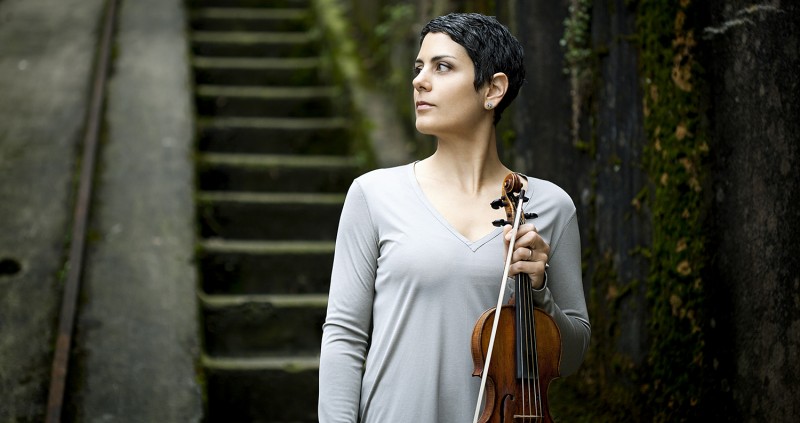This article is drawn from the fourth issue of Tafel: our magazine for the musically curious. Read the entire fourth issue here.
In Conversation with Leila Schayegh

Known for her “ravishing legato cantabile” (The Strad), violinist Leila Schayegh makes her Tafelmusik debut as guest director in April 2022. Regarded as one of the world’s leading period violinists, Schayegh is a captivating performer whose expressiveness and energy draws audiences in. She has been a professor at the renowned Schola Cantorum Basiliensis in Switzerland since 2010.
We recently caught up with Schayegh for a chat.
How did music first enter your life?
Music was part of my life from the very start. We often listened to recordings and sang together at home when I was a child, and my mother used to play the recorder. When my older brother started playing the cello, I wanted to play that instrument as well, but fell in love with the violin very quickly. I started playing at the age of five.
You studied with the great baroque violinist Chiara Banchini. What was the most important thing she taught you?
The most important was to put your own ego aside and put the music in front. It was Chiara who taught me to think about the composer’s intention, the time in which they lived, to reflect on the text, and most importantly, on what you can’t find in the text but rather in the treatises of the time. Above all, she encouraged me to not forget my own personality.
As professor of baroque violin at the famous Schola Cantorum Basiliensis, you are an important mentor and role model for a generation of young musicians. What do you hope to pass along to your students?
What Chiara told me became my own credo. In addition to this, I work a great deal on technique with my students, because without good technique we can’t express what we have in mind. And I encourage them to be strong and flexible, and to be quick learners, to survive in a world where it’s likely that their only professional option will be freelancing.
Historically oriented performances bring more colours, more opportunities, and more freedom. It’s not a restriction, it’s an enrichment.
Leila Schayegh
After years of playing baroque music, in 2018 you released a beautiful recording of Brahms violin sonatas with pianist Jan Schultsz. What inspired you to expand your repertoire to include music by classical and romantic composers?
In the years before that recording, my harpsichord partner and good friend Jörg Halubek and I had studied, played, and recorded the most important eighteenth-century repertoire for violin and obbligato harpsichord. It felt natural to extend the repertoire, and we decided to jump directly to Brahms. In the end, it was a bit too far for Jörg, so Jan Schultsz jumped in. I was ready to explore romantic repertoire in a “new/old” way and have not regretted the work it required.
What do you say to people who are skeptical about historically informed performances of romantic repertoire?
Keep an open spirit! Historically oriented performances (HIP) bring more colours, more opportunities, and more freedom. It’s not a restriction, it’s an enrichment. If you don’t like it, that’s fine, but give it a chance. Think about it like food or wine: you need time and sometimes several tries to develop your taste. The most important thing is that you are moved and touched in many ways.
Are there other musicians pursuing a HIP approach to nineteenth-century repertoire that we should know about?
Oh, there are so many! What is interesting is that nineteenth-century repertoire is the new meeting point between the “historical” and the “modern” musician. Depending on which side we come from, the result is often very, very different. The truth probably lies somewhere in the middle. I like to mention big names like violinist Isabelle Faust or fortepianist Kristian Bezuidenhout, but also the English horn player Anneke Scott or the French flute player Alexis Kossenko.
How do you prepare for the technical and interpretive demands of romantic music?
On the technical side, I mark the fingerings [position change indications] at those places where one needs to hear the change as a slide from one note to the other. Also very important is how to make the instrument sound: searching for a common, rich, lively but rather steady sound, which is brought to life by the bow. On the musical side, I search for a warm, rich interpretation that shows, as much as possible, the many different characteristics of the piece.
What activities do you enjoy when you are not teaching, rehearsing, or performing?
I am very fond of cooking, and when there is enough time, I like to make things from scratch, with my own pizza dough and pasta. But I grew up with my father’s Persian cooking, so my heart lies in the Eastern kitchen. To give all that a good counterweight, I am quite sporty and try to find time each day for a workout.
Leila Schayegh guest directs Classical Revolution: Bologne & Mozart premiering online April 7, 2022, at 8pm ET.
